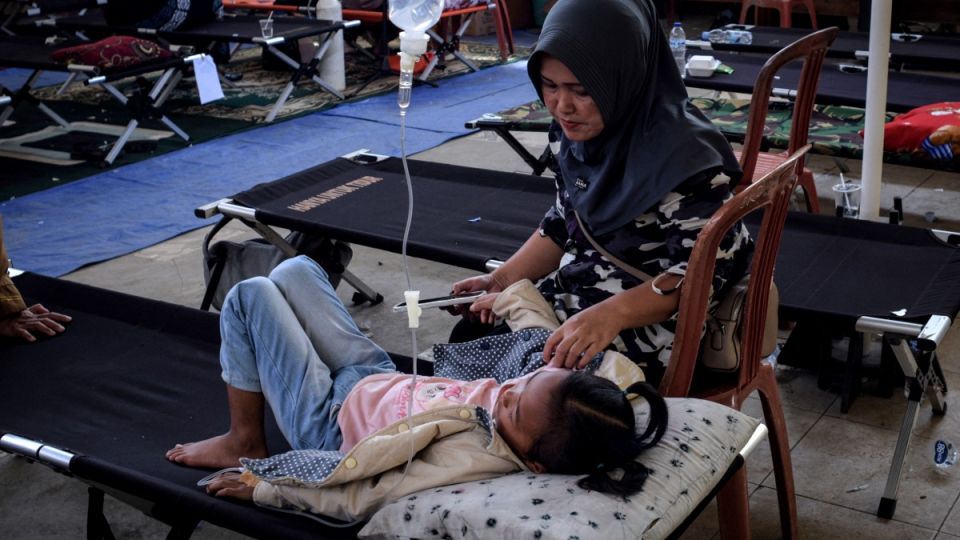October 2, 2025
JAKARTA – Parents are growing increasingly concerned about the government’s free nutritious meals program for schoolchildren amid a spike in food poisoning cases nationwide, with many fearing their children could suffer food poisoning next.
The number of cases linked to President Prabowo Subianto’s flagship program has continued to climb in recent weeks, reaching nearly 9,000 as of Sunday, according to education watchdog the Network for Education Watch Indonesia (JPPI).
The National Nutrition Agency (BGN), which manages the program, reported around 4,700 cases as of Sept. 22, but has not released updated figures since.
The rise in incidents has troubled parents whose children receive free meals at their schools daily, including 46-year-old housewife Nia from Sumedang regency, West Java, whose seventh-grade daughter, Uke, has repeatedly received stale meals.
“My daughter rarely ate the meals because they were often already stale and smelled funny,” Nia told The Jakarta Post on Tuesday. “Usually, it came from stir-fried vegetables, which varied from time to time.”
Nia noted that Uke has experienced such issues consistently since the program began in January.
“Sometimes, she would bring these funny-smelling meals home, but upon seeing them, I ended up throwing them away because they were already bad,” the mother of two added.
Her fears intensified following a recent mass food poisoning incident in nearby Ujungjaya, Sumedang, where around 105 students from three senior high schools reportedly fell ill last Thursday after consuming the free meals.
Many were treated at local community health centers (puskesmas) for severe nausea and dizziness, though authorities have yet to confirm whether the meals were the cause.
Across West Java, over 1,000 students reportedly became sick after eating the meals last week, prompting BGN head Dadan Hindayana to visit sick students in West Bandung and temporarily suspend a kitchen supplying meals to several schools for evaluation. He acknowledged there may have been “some negligence” in the food preparation process.
“I was getting more worried because of the proximity,” Nia said. “The only thing I could do was warn my daughter not to touch meals that already smelled strange.”
Effectiveness questioned
Meanwhile, 37-year-old Aditya P., a parent from Bogor, West Java, sees the poisoning spike as a sign that the program may not be achieving its nutritional goals. Prabowo introduced the initiative during his presidential campaign to help address stunting, which affects over 21 percent of children in the country.
Launched for just 3 million students at the start of the year, the program has rapidly expanded to reach around 30 million recipients, with Prabowo announcing an ambitious goal of feeding nearly 83 million children and pregnant women by year-end.
The kitchens assigned to prepare the meals, known as SPPG, have also grown from fewer than 200 in January to over 9,600. Of these, fewer than 50 have secured hygiene and sanitation certification from the Health Ministry, Presidential Chief of Staff Muhammad Qodari revealed last week.
“Personally, I don’t agree with the way this program is implemented. As a parent, you want to see your kids eating well. Yet, the menus don’t strike me as very nutritious,” Aditya told the Post on Tuesday.
Aditya described how his only son, a seven-year-old first grader at a private elementary school in Bogor, sometimes received meals such as chicken noodles or hamburgers, which was “below his expectations” of what the program promised.
However, he remains relieved that no food poisoning cases have occurred at his son’s school.
“I’m still anxious. I constantly checked with other parents after recent news of poisoning to see if anyone wants to boycott the program, but there’s no initiative yet,” he said.
Even parents whose children do not currently receive the meals, like 36-year-old Priatna from Bandung regency, are worried about future exposure.
“Seeing videos of students having seizures [after eating the meals] was scary,” he said. “The government’s response also did not help; it feels as if these victims are seen as mere statistics.”
At a recent political event in Jakarta, Prabowo applauded the program’s rapid expansion, despite some “shortcomings” from the food poisoning incidents.
“We counted all the meals served; the deviation, the deficiency or error represents 0.00017 percent [of the total recipients],” he said on Monday. However, critics remain unconvinced.
Diah Satyani Saminarsih, founder and CEO of the Center for Indonesia’s Strategic Development Initiatives (CISDI), urged the government to pause the program’s expansion.
“If you do not want to stop the project, at least do not expand the target for now,” she said. “That’s one of the concrete options [the government] should’ve taken.”


